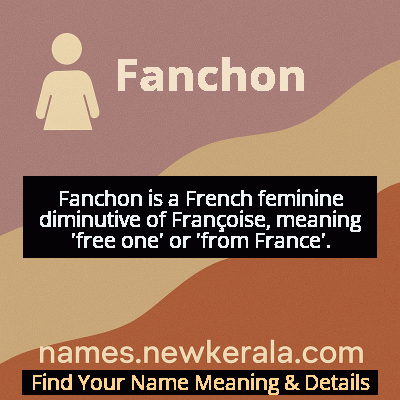Fanchon Name Meaning & Details
Origin, Popularity, Numerology Analysis & Name Meaning of Fanchon
Discover the origin, meaning, and cultural significance of the name FANCHON. Delve into its historical roots and explore the lasting impact it has had on communities and traditions.
Name
Fanchon
Gender
Female
Origin
French
Lucky Number
7
Meaning of the Name - Fanchon
Fanchon is a French feminine diminutive of Françoise, meaning 'free one' or 'from France'.
Fanchon - Complete Numerology Analysis
Your Numerology Number
Based on Pythagorean Numerology System
Ruling Planet
Neptune (Ketu)
Positive Nature
Intuitive, analytical, spiritual, and inquisitive.
Negative Traits
Secretive, reserved, aloof, and can be overly critical.
Lucky Colours
Green, yellow.
Lucky Days
Monday.
Lucky Stones
Cat’s eye, moonstone.
Harmony Numbers
1, 5, 6.
Best Suited Professions
Scientists, researchers, spiritual leaders, detectives.
What People Like About You
Depth of knowledge, analytical skills, spirituality.
Famous People Named Fanchon
Fanchon Royer
Writer and Biographer
Notable French writer known for her biographies of historical and religious figures, particularly her acclaimed work on Joan of Arc
Fanchon Moreau
Opera Singer
Renowned French soprano who performed at the Paris Opera and was celebrated for her roles in works by Lully and other Baroque composers
Fanchon Simon
Actress
French stage actress known for her performances at the Comédie-Française and her contributions to French theatrical tradition
Name Variations & International Equivalents
Click on blue names to explore their detailed meanings. Gray names with will be available soon.
Cultural & Historical Significance
Throughout French literature and theater, Fanchon frequently appeared as a character representing both traditional French femininity and progressive independence. Most notably, George Sand's 19th-century novel 'Fanchon the Cricket' cemented the name's association with rustic wisdom and natural virtue, creating an enduring literary archetype. The name's cultural significance extends beyond literature to music and performance, with Fanchon Moreau's celebrated career at the Paris Opera demonstrating how women bearing this name often broke conventions in the arts. This historical context makes Fanchon more than just a name—it represents a thread in the tapestry of French cultural identity, connecting medieval traditions with modern values of personal freedom and artistic expression.
Extended Personality Analysis
Individuals named Fanchon typically exhibit a remarkable blend of independence and emotional depth that reflects the name's meaning of 'free woman'. They often possess an innate creativity and artistic sensibility, combined with practical intelligence that allows them to navigate both imaginative pursuits and real-world challenges. Fanchons are known for their strong moral compass and loyalty to their principles, yet they maintain the flexibility to adapt to changing circumstances—a quality that makes them both reliable and innovative.
Their personality often includes a distinctive combination of traditional values and progressive thinking, enabling them to honor heritage while embracing new ideas. Fanchons tend to be excellent communicators with natural diplomatic skills, capable of understanding multiple perspectives and finding common ground in conflicts. They typically demonstrate resilience in facing challenges, drawing strength from their sense of personal freedom and self-determination. Many develop deep appreciation for cultural traditions, particularly French arts and literature, while maintaining their unique individual expression. This balance of freedom and responsibility, creativity and practicality, makes Fanchons particularly effective in leadership roles that require both vision and emotional intelligence.
Modern Usage & Popularity
In contemporary naming practices, Fanchon has evolved into a rare and distinctive choice that appeals to parents seeking names with deep cultural roots and unique character. While it doesn't rank on mainstream popularity charts, the name maintains a steady presence in France and French-speaking communities, particularly among families with strong connections to French heritage or those in artistic and intellectual circles. Recent years have seen a modest revival of Fanchon as part of the broader trend toward vintage names with meaningful histories and distinctive sounds. Modern parents choosing Fanchon often appreciate its combination of feminine elegance and powerful meaning of freedom, seeing it as a name that empowers their daughter while connecting her to rich cultural traditions. The name's rarity in the 21st century adds to its appeal for parents seeking unique names that won't be shared by multiple classmates, while its clear French origin and sophisticated sound ensure it remains recognizable and respected. Fanchon's modern usage reflects a growing appreciation for names that balance historical depth with contemporary relevance.
Symbolic & Spiritual Meanings
Symbolically, Fanchon represents the enduring human quest for freedom and authentic self-expression, embodying the French revolutionary ideals of liberty while maintaining feminine grace and cultural sophistication. The name carries metaphorical associations with natural growth and untamed beauty—much like wildflowers that flourish without cultivation, representing the idea that true freedom allows for organic development of character and talents. Fanchon symbolizes the bridge between individual autonomy and cultural belonging, suggesting that personal freedom finds its richest expression within meaningful traditions and communities.
In a deeper symbolic sense, Fanchon represents the philosophical concept of free will tempered by wisdom and responsibility. The name evokes images of the French countryside and its connection to earthy, authentic values while simultaneously suggesting the sophistication of Parisian salons and artistic circles. This dual symbolism makes Fanchon a name that speaks to both roots and wings—honoring one's heritage while having the freedom to soar beyond limitations. The name's literary associations, particularly with George Sand's rustic heroine, add layers of meaning related to natural wisdom, simplicity, and the idea that true freedom often comes from living in harmony with one's essential nature rather than conforming to external expectations.

